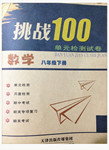完形填空
Once, a king showed two men a large basket(篮子) in the garden. He told them
to fill it with water from a well(井). After they 1 their work, he left them,
saying, “When the sun is down, I will come and see your work.”
At last, one of them said, “What’s the use
of doing this foolish(愚蠢的) work? We can 2 fill the
basket.” The other man answered, “That is 3 of
your business.” The first man said. “You may do as you like, but I’m not going
to work at something so 4 .” He 5 his
bucket and went away. The other man said no word, and kept on carrying 6 .
Finally, the well was almost 7 .
As he poured(倒) the last bucket(桶) of water into the basket, he saw a bright thing
in it. He picked it 8 . It was a beautiful gold ring.
Just then the king came. 9 _ he saw the ring, he knew
that he had found the kind of man he wanted. He told him to keep the ring for
himself. “You 10 so well in this little thing,”
he said, “that now I know I can believe you with many things.”
|
1.
|
|
A.finished
|
B.did
|
C.began
|
D.had
|
|
|
2.
|
|
A.ever
|
B.never
|
C.easily
|
D.no
|
|
3.
|
A.none
|
B.no
|
C.not
|
D.no one
|
|
4.
|
|
A.clever
|
B.foolish
|
C.easy
|
D.funny
|
|
|
5.
|
|
A.picked up
|
B.put away
|
C.took away
|
D.threw away
|
|
|
6.
|
|
A.water
|
B.basket
|
C.well
|
D.work
|
|
|
7.
|
|
A.full
|
B.empty
|
C.filled
|
D.clean
|
|
|
9.
|
|
A.While
|
B.As soon as
|
C.Before
|
D.Since
|
|
|
10.
|
|
A.did
|
B.will do
|
C.was do
|
D.were do
|
|



 挑战100单元检测试卷系列答案
挑战100单元检测试卷系列答案